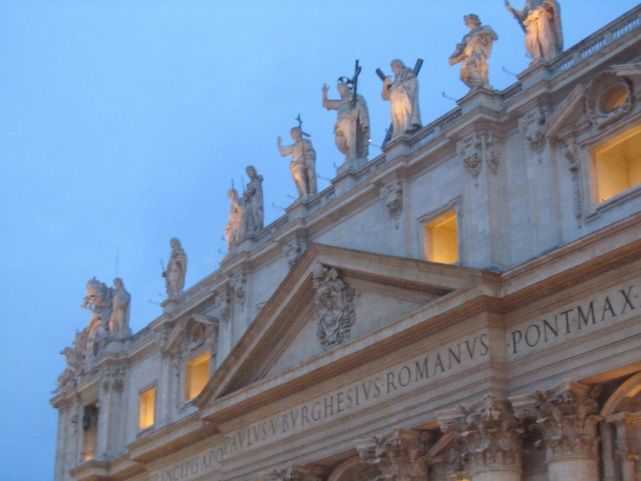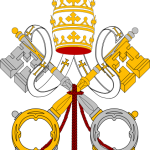Sadly, my phone is not letting me have the picture I took today, for this piece, but honestly, I didn’t get any really good shots, anyway. I am a bad photographer, and too short to get much more than pictures of taller people getting better shots. Such is life. This pic above is from 2011.
So, my recovery continues apace, and this morning I was able to be part of Pope Francis’ audience with the press. Unfortunately, his Italian was too much for mine, so I had to wait for the translated release of his remarks before I could write anything.
Even without understanding the Holy Father, though, I could tell when he was departing from prepared remarks, which he did frequently, and always, it seems, when he wanted to make an emphatic point. Also, this pope gestures with his hands, which I kind of like — he points his fingers, or arcs his arms, to punctuate his works, or perhaps to propel his thinking forward. Being raised Italian/Irish, I appreciate that; it’s very human, familiar and comfortable to me. I wonder how others receive all that motion, though.
And man, this guy is a hugger! After delivering his remarks and a blessing, he met with various members of the media, and while he received the ring-kisses with something like resignation — he is Peter, after all, and kissing the ring isn’t really about him, but about that office — he seemed perfectly fine with people coming up to him and hugging him. He betrays no sense of vulnerability or fear of intimacy. This, of course, makes me worry that he is perhaps reckless with his safety. But then, a truly faith-filled man generally does leave things like safety up to God. The lesson so many of us need to learn and relearn: the hour of our demise isn’t up to us, really, so we may as well just get on with things.
Upon reading Francis’ remarks (I calls him Francis ’cause I likes him) I found a great deal to cheer about, one thing I wasn’t sure I completely understood, and one thing that left me just plain wondering.
I liked this a lot:
I am particularly grateful to those who viewed and presented these events of the Church’s history in a way which was sensitive to the right context in which they need to be read, namely that of faith. Historical events almost always demand a nuanced interpretation which at times can also take into account the dimension of faith. Ecclesial events are certainly no more intricate than political or economic events! But they do have one particular underlying feature: they follow a pattern which does not readily correspond to the “worldly” categories which we are accustomed to use, and so it is not easy to interpret and communicate them to a wider and more varied public. The Church is certainly a human and historical institution with all that that entails, yet her nature is not essentially political but spiritual: the Church is the People of God, the Holy People of God making its way to encounter Jesus Christ. Only from this perspective can a satisfactory account be given of the Church’s life and activity.
Spot on, of course and timely, given everything that has happened in our church since February 11. Speculation about movtives, positions, camps and campaigning will always arise when dramatic events occur, but it is always necessary, when considering church actions, to remember that — whether a reporter believes it or not — the church’s thoughts are always reasoned relative to both the natural and the supernatural worlds; things seen and unseen. So few wrote about the supernatural angle of Benedict’s resignation, but we understood the involvement of the Holy Spirit in the outcome of the conclave, and even in how this pope was inspired to be “Francis” which he relates here, charmingly:
I was seated next to the Archbishop Emeritus of São Paolo and Prefect Emeritus of the Congregation for the Clergy, Cardinal Claudio Hummes…he encouraged me. And when the votes reached two thirds…he gave me a hug and a kiss, and said: “Don’t forget the poor!” And those words came to me: the poor, the poor. Then, right away, thinking of the poor, I thought of Francis of Assisi. Then I thought of all the wars, as the votes were still being counted, till the end. Francis is also the man of peace. That is how the name came into my heart: Francis of Assisi. For me, he is the man of poverty, the man of peace, the man who loves and protects creation; these days we do not have a very good relationship with creation, do we? He is the man who gives us this spirit of peace, the poor man … How I would like a Church which is poor and for the poor! Afterwards, people were joking with me. “But you should call yourself Hadrian, because Hadrian VI was the reformer, we need a reform…” And someone else said to me: “No, no: your name should be Clement”. “But why?” “Clement XV: thus you pay back Clement XIV who suppressed the Society of Jesus!
Thank goodness for translations; now I understand the audience’s appreciative laughter.
This is what I am not quite sure I understand:
How I would like a Church which is poor and for the poor.
I trust that as we get to know Francis better he will make this clearer. That he has a preferential option for the poor is already clear and admirable and inspiring, but I thought we already are for the poor and always have been, although — of course — there is always more to do. But by “a Church which is poor” does he means humble? Poor in spirit? Is he talking about dispensing with what is beautiful in the church, because it is somehow insulting for the poor? I have a hard time believing this because we have heard that Pope Francis’ favorite author is Dostoyevsky and he therefore must have some appreciation of “the world will be saved by beauty” and the transcendent beauty — both material and interior — that the church offers the world. Shared and instructive, it is all meant to better access the different routes to knowing God.
Moreover, we should not be ashamed of the beauty of the Bride of Christ and his Mystical Body. I have a cousin who is a Capuchin, like Cardinal O’Malley, and he has worked with very poor people living in destitute and often violent areas. He’s told me more than once that the poor feel condescended to when they are served the Holy Eucharist from ceramic chalices and straw baskets. “The want the beautiful things,” he says, “because God should have beautiful things and they should be able to share in that.” Beauty is evangelical.
This all reminds me of a story about Dorothy Day, who knew about working with the poor. A wealthy woman donated a diamond ring off her finger as she concluded a visit with Day. Dorothy put it in her pocket and later gave the ring to a homeless woman who had come begging. Her associates were appalled and asked her if it would not have been better for the woman, if they had sold the ring and used the money to rent a room for her for several years, or something. Dorothy said, “she can do that with the ring if she wants to; or she can sell it and go on a vacation if she wants. Or she can just wear it on her finger, and enjoy it if that’s what she wants. Do you think God created diamonds only for the rich?”
Sometimes our desire to do good, and to do it as efficiently as possible, makes us forget that honoring the dignity of the human person means being less constrictively efficacious, so the simple freedom to chart one’s own course is respected.
So, I’m not sure what our Holy Father means about having a poor church, for the poor. Seems to me we can’t do much for the poor if we are poor ourselves. Unless, of course, we are poor in spirit, which might bear astonishing fruit.
This is getting long, sorry, but I’m trying to take Francis’ advice and break things down “through the dimension of faith”,(and yes, I wander as I wonder) so here’s what left me wondering via John Thavis:
The pope’s blessing to journalists was unusual, to say the least. Saying that he realized there were non-Catholics and non-believers present in the hall, he would “give this blessing in silence, from my heart, to each of you, respecting the conscience of each person, but knowing that each one of you is a child of God.”
Then, instead of the usual formal blessing – standard practice at papal audiences – he said quietly, “God bless you,” and walked off the stage.
That left some immensely pleased at the pope’s sensitivity, and others complaining loudly: “What kind of a blessing was that?”
Well, it was the kind of blessing Pope Francis wanted to give. And more and more, I’m getting the impression that this is a man who is not simply “getting used to being pope,” but who is coming into the office with clear, and very different, ideas.
Those remarks came as a kind of clarification of previous words Thavis left out, and which are both interesting and sweet:
I love all of you very much, I thank you for everything you have done. I pray that your work will always be serene and fruitful, and that you will come to know ever better the Gospel of Jesus Christ and the rich reality of the Church’s life. I commend you to the intercession of the Blessed Virgin Mary, Star of Evangelization, and with cordial good wishes for you and your families, each of your families. I cordially impart to all of you my blessing.
That’s a straightforward, evangelical move — he’s saying he hoped every person in the room would grow in knowledge of Christ, and in appreciation for Our Lady as well. That’s as Catholic as it gets, and perhaps Pope Francis realized it and thought to clarify that in so wishing he meant no disrespect to non-Catholics. And I can get on board with that. I mean, it’s a thoughtful, sensitive move, and kind of lovely.
Apart from clarification, perhaps this was Francis’ way of demonstrating that the press, and the world, needs to be equally as respectful to the Catholic conscience as well, and if that’s the case, hey, I’m all for it — it’s a brilliant slyness!
But I don’t think Francis is about “slyness”. I think he is open and authentic. Here is what bothers me, though: if he was not simply clarifying or trying to make a point about respect and reciprocation, then why deny those Catholics present the usual Tridentine formula of blessing which typically ends such audiences? My first impression was that it seemed like overkill, mostly because media folk covering popes — whether they believe or not — expect to see pope-y stuff and hear pope-y blessings, and because they are there to simply do their jobs, they’re not supposed to grouse about the Catholicity of it all. And in fact, I’ve never heard a press person grouse about it.
So you know…why not give the Catholics there a little Father, Son and Holy Spirit?
But then again, perhaps this is the face of the New Evangelization in action, evolving into a Deep Evangelization. Pope Benedict spent eight years teaching that love mattered; perhaps Francis’ intention is to show us why it matters — because it transforms — and something so transformative ought not be constrained by boundaries of a day’s media business. Love, after all, sees the press not as the press, but as people whose souls are needy, regardless of what religion they confess or the absence of any confession at all. Imagine the impact on the heart and mind of a reporter who doesn’t believe in much of anything hearing the pope say he loves him; that he expresses respect for her person! Over time, it might bear enormous fruit that would never even bud, by intellectual engagement, alone. Spengler once said “Benedict has a mustard seed, and he’s not afraid to use it.” I think Pope Francis, via the Holy Spirit, may be Benedict’s Mustard Seed.
And yeah, if a Deep Evangelization is where we are headed, then I can go all-in for it.
Deacon Greg has video of the audience. Calah Alexander has a profound piece on Catholics playing tug of war while the church loses.
MORE: On my twitter feed some people are reading all of this and saying, “I’m worried.” Honestly, I’m not. I think we just have to get to know this pope, who is as different from our last pope as the brain is from the body. They still function together to create a wholeness.
Stop being afraid or “worried” and start wondering. Remember your Gregory of Nyssa: “ideas lead to idols, but only wonder leads to knowing.” I think if we let ourselves wonder a little about Francis, instead of letting all sorts of “ideas” run rampant between him and us (which the devil would just love) we may find that we’re on a breathtaking new journey.
And thanks be to Benedict for understanding that another speech and another encyclical would not have changed the unhealthy trajectory of the church. Something is being made new. In the gambit for the souls of the human race, we’re going all-in because nothing less will do.
Or, as one Italian nun said to me after Francis had finished his first remarks on the balcony of St. Peter’s: “hold onna you hat! The Holy Spirit is a changing wind!”
UPDATE:
Kat has a sensible perspective on a video that has people “worried”, too.
Ed Morrissey, who was also at the media event (and shared a meal with me, afterwards) has video and pictures and his own thoughts on Francis’ way.
Sr. Mary Ann Walsh has more on the meeting
5 easy ways to love the poor in honor of this pontificate
NY Times sees nothing deeper than “tolerance” Snore.
NBC News seens not to know that Pope Benedict wore the identical “simple white robes” they find noteworthy in Francis, and isn’t wondering about Francis’ meaning. Perhaps demonstrating why Deep Evangelization is needed.












